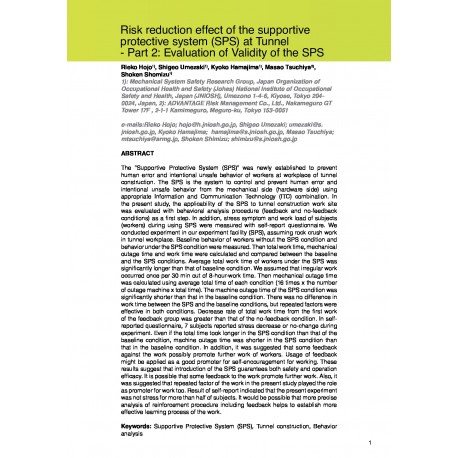Cart
0
0
No document
0,00 €
Total
Document successfully added to your shopping cart
Quantity
Total
There are 0 items in your cart.
There is 1 item in your cart.
Total documents
Total shipping
To be determined
Total
Search & filter
Search for a publication
Search & filter

Risk reduction effect of the supportive protective system (SPS) at Tunnel - Part 2: Evaluation of Validity of the SPS
3893_risk_reduction_effect_of_th
S. Shomizu / S. Umezaki / K. Hamajima / M. Tsuchiya / R. Hojo
The "Supportive Protective System (SPS)" was newly established to prevent human error and intentional unsafe behavior of workers at workplace of tunnel construction. The SPS is the system to control and prevent human error and intentional unsafe behavior from the mechanical side (hardware side) using appropriate Information and Communication Technology (ITC) combination. In the present study, the applicability of the SPS to tunnel construction work site was evaluated with behavioral analysis procedure (feedback and no-feedback conditions) as a first step. In addition, stress symptom and work load of subjects (workers) during using SPS were measured with self-report questionnaire. We conducted experiment in our experiment facility (SPS), assuming rock crush work in tunnel workplace. Baseline behavior of workers without the SPS condition and behavior under the SPS condition were measured. Then total work time, mechanical outage time and work time were calculated and compared between the baseline and the SPS conditions. Average total work time of workers under the SPS was significantly longer than that of baseline condition. We assumed that irregular work occurred once per 30 min out of 8-hour-work time. Then mechanical outage time was calculated using average total time of each condition (16 times x the number of outage machine x total time). The machine outage time of the SPS condition was significantly shorter than that in the baseline condition. There was no difference in work time between the SPS and the baseline conditions, but repeated factors were effective in both conditions. Decrease rate of total work time from the first work of the feedback group was greater than that of the no-feedback condition. In selfreported questionnaire, 7 subjects reported stress decrease or no-change during experiment. Even if the total time took longer in the SPS condition than that of the baseline condition, machine outage time was shorter in the SPS condition than that in the baseline condition. In addition, it was suggested that some feedback against the work possibly promote further work of workers. Usage of feedback might be applied as a good promoter for self-encouragement for working. These results suggest that introduction of the SPS guarantees both safety and operation efficacy. It is possible that some feedback to the work promote further work. Also, it was suggested that repeated factor of the work in the present study played the role as promoter for work too. Result of self-report indicated that the present experiment was not stress for more than half of subjects.


